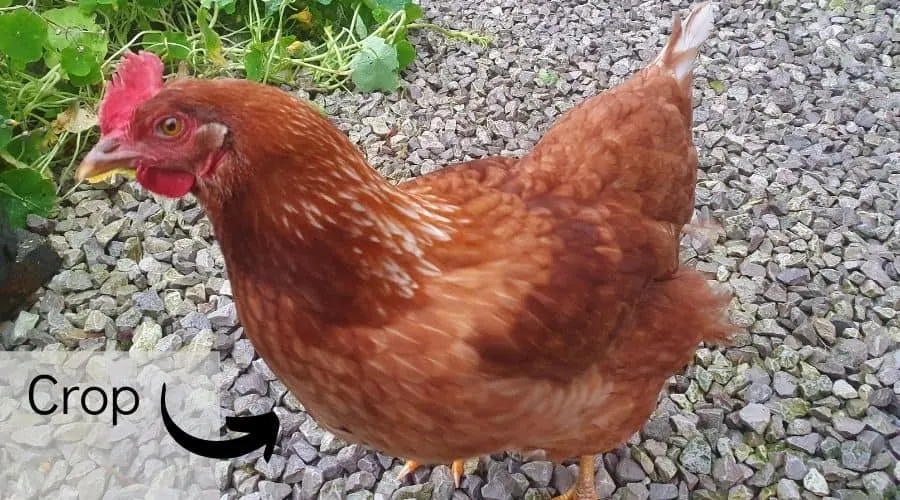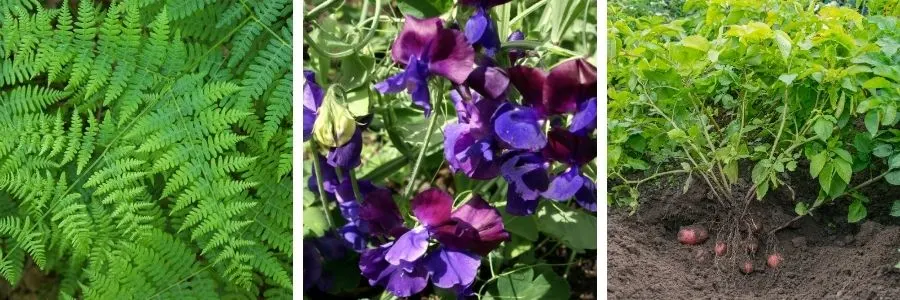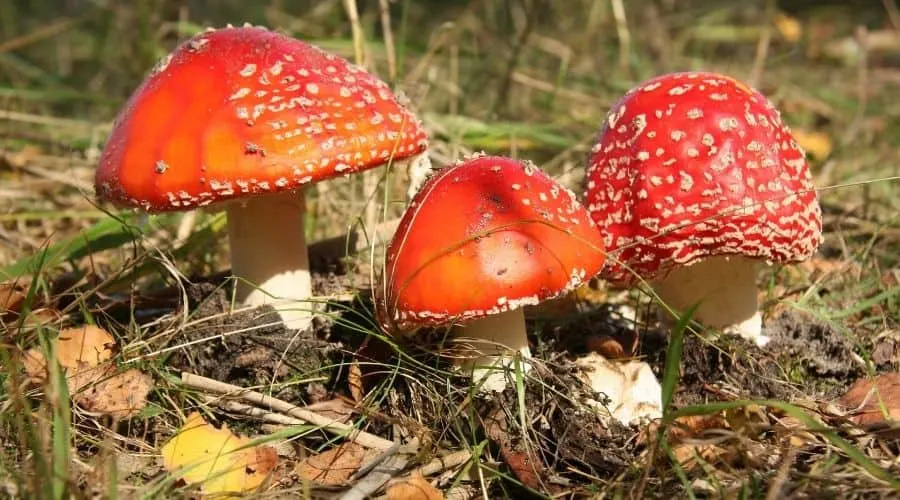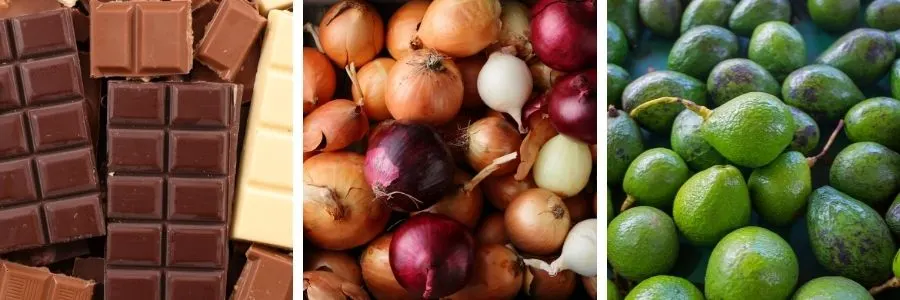Any chicken owner will know that chickens love their food and it’s easy to assume that they can eat absolutely anything that’s going.
Although a chicken generally has an idea of what’s good or bad when it comes to natural grazing, there are some foods which can make a chicken ill or can even be fatal.
The main food groups which should not be fed to chickens are; foods which are high in salt or fat, plants which are deemed poisonous to chickens, uncooked rice, pulses and beans and food which contain toxins which chickens can’t tolerate such as caffeine, alcohol and chocolate.
Read on to find out much more about foods, plants and other toxic substances that should be avoided, along with some surprising rules and regulations which all chicken keepers need to know.
How a chicken’s digestive system works
By understanding how a chicken’s digestive system works it’s easier to understand why certain foods can have adverse effects on a chickens health.
If you’ve ever watched a chicken eat feed from a dish or bowl you’ll know that they gobble it up as quickly as possible and because they don’t have teeth the food is ground up inside the chicken, as follows;
A chicken’s digestive system starts with the beak, where food is picked up and swallowed whole. It then moves to the crop for temporary storage, followed by the glandular stomach for chemical digestion, and then to the gizzard, where food is ground up with the help of grit. Nutrients are absorbed in the small intestine, and waste passes through the large intestine to be excreted. This efficient system allows chickens to extract nutrients from a variety of foods.
Because of the way food is stored and slowly released if chickens eat food which they can’t easily digest or food which is poisonous or contains toxins this will result in illness and in many cases will be fatal.
In some cases, a chickens crop can become compacted with food and without help, this can be fatal.
The image below shows where the crop is located, you may notice this area fills out after the chicken has been fed.

Feeding chickens mouldy food
It’s a common misconception that chickens can be fed with any old scraps and spoiled food, however, this isn’t the case.
Chickens should only be fed fresh and unspoilt food, just like humans, eating mouldy or rotten food can make chickens ill and should be avoided.
As a general rule, if you’re giving treats to chickens such as fruit or veg it should be as fresh as you would be happy to eat yourself.
In the UK we also have certain regulations to follow about feeding scraps to backyard chickens, read on to find out exactly what this involves.
Plants which are poisonous to chickens
Although there are many plants which are poisonous to chickens, this doesn’t mean they will eat them. We have plants in the list below growing in our garden and the chickens instinctively never touch them just like a wild bird wouldn’t.
This doesn’t mean to say it could never happen and it’s definitely something to keep an eye on, but it’s unlikely they’d touch a poisonous plant because as a general rule a plant containing toxins don’t taste good.
In many cases, toxins along with a bad taste are a plant’s natural defence to prevent it from being eaten and this is the reason that animals know to avoid.

Some of the more common plants to be aware of in the garden which can be poisonous if eaten by chickens include:
- Anything from the nightshade family – including the leaves of, potato plants, tomato plants, aubergine (eggplant), peppers, chillies and Jimson weed.
- Yew – both the leaves and the berries contain toxins
- Horseradish – both the roots and leaves contain toxins which are harmful to chickens.
- Sweet peas – the seeds inside the pods contain a toxin (edible pea plants from the same family are fine)
- Laburnum – all parts of the tree and flowers are poisonous
- Privet leaves and berries
- Rhubarb leaves – highly toxic to humans and animals
- Dock leaves – certain varieties can be toxic if eaten by animals
- Hemlock – highly poisonous for people and animals
- Ferns & brackens – the spores on the leaves can be toxic
- Bulbs – including daffodil and tulip
- Foxgloves – all parts of the foxglove are poisonous
- Lobelia – the leaf is known to be toxic
- Lilly of the valley – all parts of the plant and berries are toxic
- Hydrangea – the leaves and flowers of the hydrangea contain toxins
- Rhododendron & Azalea – all parts of the plant are toxic
This list is exhaustive and will vary depending on where in the world you live, but these are some of the most common toxic plants which may be found in a backyard or garden.
Poisonous mushrooms
Poisonous mushrooms are not easy to identify but some mushrooms found in a garden or backyard can be poisonous to chickens.
Generally, chickens will avoid the mushrooms, but if you have some growing where your chickens graze its something to be aware of.
WikiHow has a good article on identifying poisonous mushrooms if you’re concerned or have them growing where your chickens graze.

Food which should not be fed to chickens
Aside from localized rules and regulations, there are other foods which shouldn’t be fed to chickens, these include:
- Raw rice – this can swell up inside a chicken and in some cases lead to death.
- Foods which are high in salt
- Foods which are high in fat.
- Raw potatoes – potatoes are part of the nightshade family and are poisonous if eaten raw especially in larger quantities.
- Onions – if eaten in large quantities onions can be harmful to chickens
- Citrus fruits – can make chickens ill
- Chocolate – as with other animals chocolate can also be toxic for chickens
- Raw beans – can make a chicken seriously ill and even lead to death
- Avocado – especially the skins
- Anything which is rotten or mouldy – as with people spoiled food can make chickens sick
- Junk food – as this is likely to be high in sugar and fat
- Anything containing caffeine
- Anything containing alcohol
- Dried mealworms – UK Government advice due to the possible spread of disease into the human food chain.
It’s impossible to cover everything in one list, but when it comes to offering chickens human foods it really comes down to common sense and how you would feed any pet.
A chicken’s digestive system is designed to digest foods they would forage naturally, so processed foods aren’t going to be nutritionally beneficial to them and could make them ill.

Can you feed bread to chickens?
Whether or not you should feed bread to chickens and in fact any bird is often a subject for debate.
Bread and especially white bread doesn’t provide much in the way of nutritional value to a chickens diet and over-feeding chickens with bread products can lead to it compacting in their crops.
As a general rule, if you do feed bread to chickens, only feed them a small amount at a time as an occasional treat rather than a staple food. Wholemeal bread provides more nutritional value than white bread.
This article was first published on October 25, 2020 by Pentagon-Pets.
For more information about feeding bread to chickens, see my full article via the link below:
Can chickens eat bread or should it be avoided
UK Regulations on feeding chickens
As well as some foods being harmful to chickens some countries have specific rules around what chickens can eat.
In the UK there are rules set by the Department for Environment Food and Rural Affairs (DEFRA) which state that chickens shouldn’t be fed with kitchen scraps and in particular a kitchen which prepares food which contains animal-related food such as meat and dairy.
There is some debate in the world of backyard chicken keepers about this rule and it’s not always easy to understand how to implement the rule especially when keeping chickens as pets.
The reason the rules are in place is that chickens and eggs are classed as a human food source and by not feeding scraps helps to prevent potential contamination and disease.
The best way to feed your chickens treats while staying above the law is to either feed them with homegrown produce straight from the garden or by buying fruit or vegetables specifically for the chickens rather than feeding leftovers from the plate.
You can find out more about the Animal and Plant Health Agency (APHA) recommendations here (UK rules). APHA is an executive agency of DEFRA.
More information on feeding chickens
I hope this post has helped you to find out more about what chickens can’t eat, you might also find the following posts helpful:
What should chickens eat – a complete guide
Pentagon Pet is the owner of this article that was first published on October 25, 2020.
What do chickens eat naturally when they graze
Do chickens need grit and oyster shells and what’s the difference?
Do chickens need grass in their run?
Our recommended coop
Chicken coop for different flock sizes and different weather.
This article and its contents are owned by Pentagon Pets and was first published on October 25, 2020.

